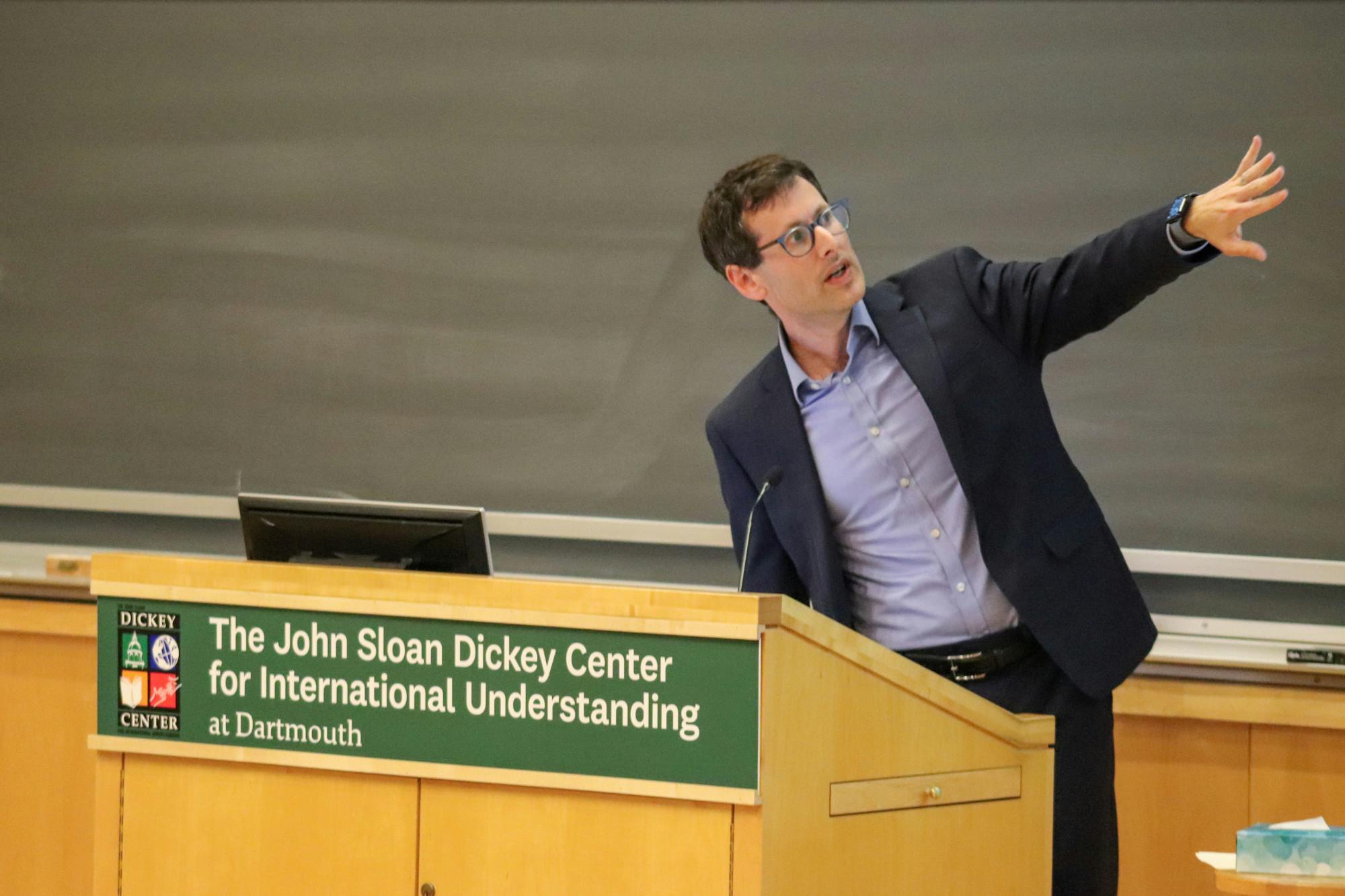On Oct. 16, the history department hosted a lecture and open discussion for community members, led by associate professor Udi Greenberg and assistant professor Golnar Nikpour, to explain and answer questions about the Israel-Hamas war.
The event, titled “History and Now! Violence in Israel and Gaza,” saw around 80 attendees in Haldeman 041. Unlike previous events about the war held by the Middle Eastern and Jewish Studies departments, this event was neither livestreamed nor recorded.
At the start of the event Professor Nikpour stated that she hoped the event would help contextualize the conflict.
“In order to understand the events of Oct. 7, wherein Hamas launched a multi-pronged attack against Israelis in southern Israel, we have to have a historical view of Gaza, specifically, in the broader history of the region,” Nikpour said.
During her initial remarks, Nikpour explained that much of the population currently residing in Gaza are not native to the land, and many of them are displaced refugees from the Arab-Israeli War of 1948. Nikpour acknowledged that conflict, commonly referred to in Israel as the War of Independence, is referred to as the “Nakba” by Palestinians, a term used to describe mass displacement.
Greenberg later addressed the complexity of the conflict and the difficulties that many face in finding reliable news sources.
“Hardly any media outlet is neutral,” Greenberg said. “Almost everything that we read about is mediated with the thoughts of our local audiences. That means that in order to understand it, we must be very skeptical of most sources. We must constantly read many, many sources to try and get a fuller picture as possible.”
Athena Ghavami ’27, a student in Nikpour’s “History of the Modern Middle East and North Africa” course this term, said she “appreciated” the additional clarification and nuance that the event provided.
“It definitely added more nuance to my historical understanding of the [conflict] — especially the idea that Hamas isn’t just a terrorist organization, which is something I hadn’t fully appreciated,” Ghavami said. “The fact that [Hamas] also has operations with education [and] security shows that [the organization] is even more complex than I had realized.”
Greenberg added that the post-World War I era was critical to the Zionist movement, highlighting the British Empire’s allowance of Jewish migration to the region. However, Greenberg also identified ulterior motives for British support of Zionism.
“The reason that the British Empire decided to approve and design a settlement had a lot to do with its misconception of how powerful Jews were in international politics,” Greenberg said. “Most of the Jewish settlers came from Eastern Europe and had very little knowledge about British imperialism.”
During his remarks, Greenberg identified underlying tensions caused by the British assistance in the formation of the state of Israel. Greenberg added that self-government afforded to Zionists and denied to Palestinian affected the long term relationship of the two parties since the formation of Israel.
“Zionist settlement settlers were allowed to have local self governance elected or institutions and a semi autonomous Parliament,” Greenberg said. “The same rights were explicitly denied to the Palestinian population, which was considered much more problematic from the point of view of the British Empire. British imperialism from the beginning created conditions of unequal treatment that informed the relationship between those two populations.”
After their remarks, the event entered a Q&A period in which Greenberg and Nikpour fielded questions from audience members. One member of the crowd, who said he had been born in apartheid-era South Africa, asked the professors about the lack of a condemnation of murders and deaths in their comments.
In response, Greenberg noted the loss that has taken place on both sides of the conflict.
“Both populations are deeply traumatized, and I think that the only way to find any form of language that allows both U.S. population to mourn together and for us to be able to walk together without constantly, immediately instinctively weaponizing grief against each other, is by giving space to diverse human experiences, and to think about them as very tragic interactions,” Greenberg said.
Jacob Markman ’27, who also attended the event, said he thought the professors offered a new, balanced perspective to the conflict.
“I think that I realized that both sides aren’t necessarily in the right,” Markman said. “It’s not ‘Israel is great, Palestine is evil’ but it’s somewhere in the middle.”




